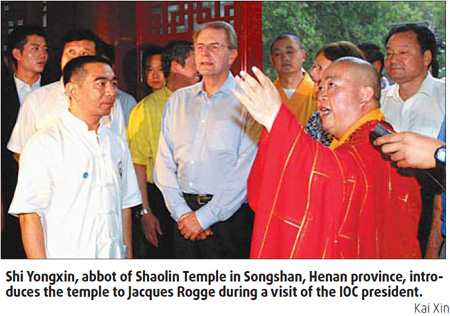Theoretically there should be a balance between protection and development. In reality, few know where the fine line is. Tourism is touted as the "smokeless" industry that has numerous benefits and few drawbacks. If you apply some thought to the controversy, you'll find that conventional wisdom may not hold water. A few years ago, there was news of a developer who wanted to build a dragon-like structure along a mountain ridge. The public was appalled and the project was halted. Later a Shandong county got approval to build a mammoth city over a large swath of mountains, which it billed as the future "cultural capital of China". Again, the public response was predominantly critical. The sentiment was: Leave nature alone, don't add a human touch.

But when you tour Mount Wudang, it's the man-made structures that are hailed as the landmarks and highlights of a tour. With a few exceptions such as Jiuzhaigou, where nature alone is enough to be a selling point, most places sell because of the embellishments, rather than nature itself. And don't even think of citing the Great Wall. It was a white elephant that failed to fend off invaders and a major scratch on Earth's back.
A site usually has to demolish a lot of existing buildings to "restore the ecosystem". A county in Guizhou, which I visited a year before it got on the major-league list, razed cheap hotels, a school and many residential houses at a cost of tens of millions of yuan before it submitted the application. Sanqingshan, a new entry on the list, converted the hotels to dormitories for field workers.
I'm not defending the develop-at-all-cost camp. I'm just saying it's really hard to sit down and listen to all sides and then go about making the right decision. Local officials want to develop tourism. Of all the reasons at least one is noble - to help the people live a better life. Wrongly or not, they are using the UNESCO title as a free pass, while paying lip service to all the wonderful words embraced by environmental protectionists. Are they being hypocritical or is it the only choice they have?
If I had tens of millions to splurge, I wouldn't necessarily go for the prestige of a UNESCO listing. Instead, I would invite a bunch of writers from Lonely Planet, Fodor's and Frommer's, among other travel guides, and treat them to a good time at my place. Once I gain an entry into their books and possibly get a recommendation, foreign tourists will swarm in. Then China's own adventure seekers and active travelers will follow. Eventually the charter flights and tour buses will arrive, bringing in millions of customers of package deals.
That's why Mount Songshan and its Shaolin Temple do not need the extra help of UNESCO. They already have so many visitors and kungfu master wannabes that they are rolling in cash, shaved heads, sinewy torsos and all. As a matter of fact, Shi Yongxin, the abbot, is often addressed as "CEO".
I hereby advise that any place with a full quota of tourists should forfeit its chance for the glorious yet commercial title. Only places with residents under the poverty line need the UNESCO shot in the arm. Cachet? Who needs it when you have cash?
相關(guān)閱讀:
